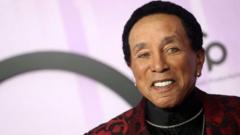Friedrich Merz, a former corporate lawyer and leading candidate for Chancellor of Germany, encountered significant challenges in his campaign after failing to win the necessary votes in Parliament. Despite being perceived as well-prepared, he has faced criticism for an inability to plan effectively and a series of broken promises.
Friedrich Merz's Bid for German Chancellorship Faces Setbacks

Friedrich Merz's Bid for German Chancellorship Faces Setbacks
Political observers are left questioning Merz's future after a rocky parliamentary vote where he failed to secure the chancellorship amid rising opposition.
After experiencing a significant blow to his political aspirations, Friedrich Merz's campaign for Chancellor of Germany has raised doubts about his leadership capabilities. Once celebrated for his readiness and strategy, Merz's recent inability to secure the required votes has placed him under a spotlight as his political future hangs in the balance.
Known for his roots in the affluent Sauerland region of Germany, Friedrich Merz has strived to connect with voters using the slogan, “More Sauerland for Germany.” However, his political journey has faced turbulence following the recent election campaign where he was unable to clinch the chancellorship on the first ballot — a rare setback in the history of German politics.
Once a corporate lawyer, Merz made headlines when he dramatically parachuted into an event for the French Foreign Legion in Corsica. This daring act exemplifies his boldness, a trait both praised and scrutinized in his political career. His supporters laud him as a capable leader prepared to address crucial national issues such as economic growth and immigration reform. John P. Schmitz, a former deputy White House counsel, affirmed Merz's depth and thoughtful approach.
Nonetheless, critics question his ability to foresee future challenges or plan beyond immediate decisions, often leading to contradictions in his policy positions, particularly regarding spending and migration. His recent struggles in the polls reveal a discontented electorate, as the far-right Alternative for Germany (AfD) has gained ground, leveling competition with his party.
Reflecting on his decision-making shortcomings, Ruprecht Polenz, a former secretary general of Merz’s party, articulated the need for strategic foresight that Merz has yet to demonstrate consistently. As he navigates a pivotal moment for Germany’s leadership, Merz’s potential ascent remains uncertain, highlighting broader challenges in German politics as the nation seeks effective leadership to address both domestic and international concerns.
Known for his roots in the affluent Sauerland region of Germany, Friedrich Merz has strived to connect with voters using the slogan, “More Sauerland for Germany.” However, his political journey has faced turbulence following the recent election campaign where he was unable to clinch the chancellorship on the first ballot — a rare setback in the history of German politics.
Once a corporate lawyer, Merz made headlines when he dramatically parachuted into an event for the French Foreign Legion in Corsica. This daring act exemplifies his boldness, a trait both praised and scrutinized in his political career. His supporters laud him as a capable leader prepared to address crucial national issues such as economic growth and immigration reform. John P. Schmitz, a former deputy White House counsel, affirmed Merz's depth and thoughtful approach.
Nonetheless, critics question his ability to foresee future challenges or plan beyond immediate decisions, often leading to contradictions in his policy positions, particularly regarding spending and migration. His recent struggles in the polls reveal a discontented electorate, as the far-right Alternative for Germany (AfD) has gained ground, leveling competition with his party.
Reflecting on his decision-making shortcomings, Ruprecht Polenz, a former secretary general of Merz’s party, articulated the need for strategic foresight that Merz has yet to demonstrate consistently. As he navigates a pivotal moment for Germany’s leadership, Merz’s potential ascent remains uncertain, highlighting broader challenges in German politics as the nation seeks effective leadership to address both domestic and international concerns.



















